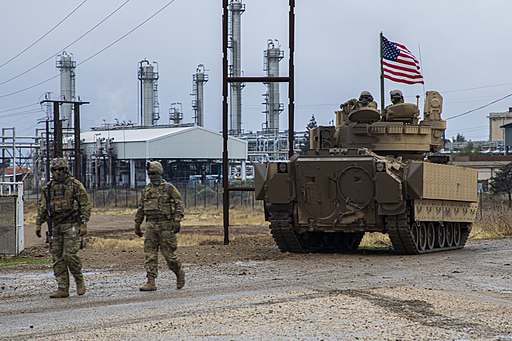Photo by Spc. Tarako Braswell, Public domain, via Wikimedia Commons
Now comes the hard part for U.S. President Joe Biden’s Iraq policy.
At the White House last week, he told Iraqi Prime Minister Mustafa al-Kadhimi that U.S. combat troops would be withdrawn from Iraq by year’s end. At the same time, U.S. forces serving in noncombat roles—training, advising, and providing intelligence to Iraq’s security forces—would remain.
A big deal? Not really. The fact is that the vast majority of the 2,500 U.S. service members in Iraq have been in noncombat roles for more than a year. Consider this headline from a July 2020 U.S. military press release: “Coalition Task Force-Iraq transitions to Military Advisor Group.” Sound familiar?
Last Monday’s announcement of a so-called withdrawal was more about semantics than policy. It was an exercise in political theater aimed at helping Kadhimi appease elements in Iraq that are opposed to the U.S. presence—above all, powerful Iranian-backed Shiite militias and their supporters among Iraqis, who will be voting in national elections in October.
No doubt Biden’s announcement was a well-intentioned gesture. But it was almost certainly too clever by half: In two statements released shortly before and after the Biden-Kadhimi meeting, the so-called Resistance Coordination Committee, comprising Iran’s most fervent militia allies in Iraq, declared that they’re not buying a relabeling of the U.S. role in Iraq. They called the announcement a “fraud” and “manipulation” designed to “prolong the [U.S.] hegemony.” They’ve made clear that they won’t accept a single U.S. soldier remaining on Iraqi soil under any pretext. It doesn’t matter what they’re called, combatant or noncombatant—all of them must go. If they don’t, the militias promised to do “everything” to “purify our holy land from the abomination of the occupiers.”
Biden should take them seriously. Since he entered office six months ago, there’s been a significant escalation of attacks against U.S. personnel in Iraq. Iraqi militias have targeted U.S. troops in Iraq and just across the border in Syria more than 30 times since Biden took office, including at least a dozen attacks in July alone.
It’s not only the absolute number and tempo of attacks that have increased. They’re also becoming more sophisticated. Most worrying, the militias are now using advanced, accurate Iranian-supplied drones that are capable of evading U.S. defenses. The first such attack in April targeted what was supposed to be a secret CIA hangar in Iraqi Kurdistan, underscoring the step change in threat level now facing U.S. personnel.
Casualties have thankfully been low, with no American deaths. But there’s good reason to believe that as the lethality and sophistication of the weapons being used escalates, Iran and its militia proxies may increasingly aim to kill, not just harass, Americans.
There’s little doubt that the Iranians have been testing Biden. And why shouldn’t they? They’ve watched him retreat from Afghanistan. They see how eager he’s been to reenter the Iran nuclear deal. They know he badly wants to calm tensions in the Middle East so he can focus on his domestic agenda and China.
In Iran’s eyes, Biden has exhibited all the telltale signs of an overeager buyer entering a market. So why not push for even greater concessions at nuclear negotiations while continuing to advance ever closer to nuclear weapons capability? Why not increase attacks on U.S. positions in Iraq to see if Biden can be pressured to cut and run?
One does sense that it’s dawned on the Biden administration that the Iranians view them as an easy mark. And Biden has been in the foreign-policy game long enough to know how dangerous that can be. In an effort to disabuse Iran of the idea, Biden has twice authorized retaliatory strikes against militia positions on the Iraqi-Syrian border. It hasn’t worked. Indeed, after the second strike, Iran’s Iraqi proxies responded by launching the largest attack on U.S. forces since Iran itself fired a salvo of ballistic missiles at them following former President Donald Trump’s targeted assassination of Iran’s top general, Quds Force commander Qassem Suleimani, in Baghdad in January 2020.
The reality is that deterrence against Iran can’t be bought on the cheap. When the world’s most powerful nation responds to dozens of potentially lethal attacks on its soldiers with two pinpricks in the desert, it screams that the United States is deliberately avoiding a real confrontation. It tells Iran that it has escalation dominance in the Iraqi theater and that if its proxies keep pushing, the odds are high that Biden will eventually fold rather than fight. Instead of seeing Biden’s retaliatory strikes as a message of worse to come if they don’t cease and desist, Iran and its proxies have likely concluded he’s bluffing and is close to pulling out completely. Worse than a failure, Biden’s response to the onslaught of attacks has been a provocation.
If Biden thought that his diplomatic sleight-of-hand with Kadhimi stood a chance of fooling Iran into standing down, he’s almost certainly in for a rude awakening. The effect is more likely to be that of waving a red cape in front of a bull. Iran and its proxies have picked up the scent of U.S. retrenchment, and as the reaction of the militias to Biden’s announcement makes clear, there’s every chance that the second half of 2021 will be even more dangerous for U.S. personnel in Iraq than the first. Does Biden understand that? Having apparently decided that the benefits to U.S. interests of staying in Iraq outweigh the costs, is he actually prepared to pay the price of making sure that his strategy succeeds?
John Hannah is a senior fellow at the Jewish Institute for National Security of America and a former national security advisor to Vice President Dick Cheney.
Originally published in Foreign Policy

